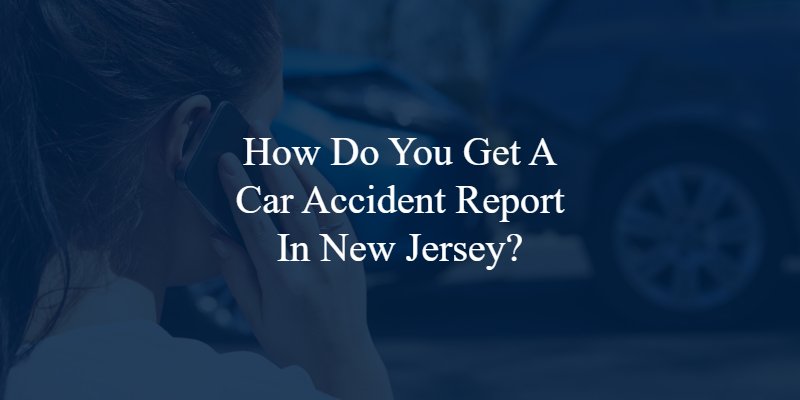Getting a Car Accident Report In New Jersey
Request a Free ConsultationA car accident can completely disrupt your life, especially if you or a loved one suffered injuries. Even after you’re on the road to physical recovery, the car accident claim process to recover compensation for damages causes additional distress. Although hiring a car accident attorney in New Jersey to manage your claim is the best way to protect yourself against the stress of the process and ensure that you’ll get the maximum compensation available, getting a copy of your car accident report in New Jersey is a critical first step. So how does a car accident victim get a copy of their New Jersey car accident report?

Is There Always a Police Report After a New Jersey Car Accident?
Those involved in a car accident in New Jersey must report their accident unless it’s only a minor fender-bender with no injuries and less than $500 in property damage. Unless your accident involves little more than a scratch on a car’s paint job, it’s always best to call and report the accident to the police. Even if there are no obvious injuries, it’s not uncommon for car accident victims to experience delayed symptom onset and discover injuries later, particularly injuries that develop symptoms after hours or even days of inflammation—such as whiplash.
When the police arrive at an accident, they generate a police report by documenting critical information.
When Do I Have to File a Police Report After a New Jersey Car Accident?
New Jersey law requires car accident victims to report most accidents to the police unless the accident involves little more than a scratched car door, in which case drivers must exchange contact and insurance information. Those involved must report any accident with $500 or more in property damage and/or any car accident with injuries.
When the police arrive at the scene of a car accident in New Jersey, they generate the car accident report, making it unnecessary for an accident victim to take further steps to report the accident. If the police did not come to the accident location, drivers must self-report through New Jersey’s Department of Transportation Crash form, which is available online. Drivers must report the accident within 10 days. It’s essential to report an accident and obtain a copy of the accident report to recover compensation for damages.
Self-Reporting a Car Accident If the Police Do Not Come to the Accident Scene
If a car accident doesn’t appear to involve injuries, the police may choose not to come to the accident scene. This sometimes occurs due to insufficient on-duty officers or a large officer response to a more serious emergency. If the police don’t arrive at an accident scene, the involved drivers must self-report the accident to their local police to generate the New Jersey car accident report. New Jersey’s online reporting tool at the Department of Transportation makes it easy for car accident victims to self-report a crash. Involved drivers must report their car accident within ten days of the crash date if the police did not visit the accident scene.
It may take a week or more before a car accident report is complete and available to the involved drivers.
How Do I Get a Copy of My Car New Jersey Accident Report?
A car accident report is a matter of public record. When you are one of those involved in the accident, the report is necessary for an insurance claim under the state’s no-fault insurance laws or—under specific circumstances—it becomes key evidence in a lawsuit. There are several ways to obtain a copy of your police report depending on where the accident occurred. If the accident didn’t happen on a toll road, contact the New Jersey State Police at (609) 882-2000 ext. 2234. For accidents on the New Jersey Turnpike, contact the New Jersey Turnpike Authority at (732) 442-8600 ext. 2431. You can also email the turnpike authority at njsprecords@njsp.org. One of the easiest ways to obtain your report is to use the New Jersey State Police or Turnpike Authority Crash Report Request systems to download a copy of your crash report. Finally, If the car accident caused a fatality, you can only request the report by filling out the OPRA Form.
What Information Does the Accident Report Include?
The police report of a New Jersey car accident contains information that’s essential to a claim to recover your damages, It includes information like the following:
- The date and approximate time the accident occurred
- The location of the accident
- The names of all drivers involved
- The descriptions of the vehicles
- The vehicle identification number (VIN)
- Photographs taken at the scene
- Copies of any citations issued by the police
- Descriptions of injuries
- Statements of drivers and eyewitnesses
The report also contains a summary of the police officer’s opinion about the cause of the accident. The responding officer may add notes about the weather and traffic conditions when the accident occurred.
How Can a Car Accident Lawyer In New Jersey Help?
New Jersey’s insurance laws were enacted to make car accident claims less complicated compared to states with fault-based insurance systems where injury victims must prove the at-fault driver’s negligence. Unfortunately, many New Jersey car accident victims do not receive the full compensation they’re due after an accident with injuries because they believe an attorney isn’t necessary in a no-fault insurance state.
Instead of settling for less, reach out to Grungo Law for the car accident attorneys in New Jersey who can help you obtain the highest possible settlement or court award for your car accident damages like medical expenses and lost earning as well as the cost of repairing or replacing your vehicle.
